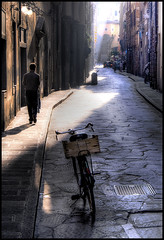 When an author attempts to pen a police procedural in omniscient point a view, readers have reason to take pause. After all, a moribund crime fiction subgenre written in a technique that fell out of favor ages ago could signal that the author is exceptionally foolhardy -- or (should the title somehow succeed) exceptionally talented. With The Marshal of the Borgo, Joseph D'Agnese more than falls into the latter category.
When an author attempts to pen a police procedural in omniscient point a view, readers have reason to take pause. After all, a moribund crime fiction subgenre written in a technique that fell out of favor ages ago could signal that the author is exceptionally foolhardy -- or (should the title somehow succeed) exceptionally talented. With The Marshal of the Borgo, Joseph D'Agnese more than falls into the latter category. Matteo Scarpone believes he is cursed. A high-ranking member of the carabinieri (Italy's national police force), he has found himself reassigned to a tiny town -- or borgo -- in the Italian countryside. The position of marshal ought to go to a local, a lifer, a rube, not an investigator who built his career in bustling Rome. But personal and professional tragedy conspire to send him into exile with a mind so fractured he can barely stomach a mouthful of food. Not a promising end. A marshal can't expect much excitement. Nothing happens in the borgo except for the occasional domestic disturbance or drug overdose. Then one day a landowner discovers a dead man in her vineyard. A dead man stripped of his clothing. A dead man with a strange substance smeared on his body. Soon enough, Scarpone will have more excitement than he knows how to handle, including a local girl who claims magical powers, a glib-tongued noble with a flexible view of the truth, and a mysterious supernatural presence shadowing his every move.
Back when I reviewed for The Magazine, a coworker expressed incredulity at the American appetite for crime dramas. Just consider how we're the nation of Ed McBain's 87th Precinct series, Law & Order, NCIS, True Detective, CSI, and all their manifold variations. No wonder many crime writers have shied away from detailing nitty-gritty policework; we're down to the last few flakes of gold in that mine. D'Agnese keeps readers' interest, though, by breaking up the procedural stuff with character drama, dark fantasy, hardboiled, and (most surprisingly) travel literature. A haughty pathologist goes slumming with a crass village cop out of sheer loneliness. A young witch may actually not be the fraud everyone suspects. Scarpone's final assignment in Rome ends with blood-slicked asphalt and the smell of cordite. And the descriptions of rural Italy's countryside and cuisine will make you want to start packing your bags.
As fun as the structure is, I found the handling of the point of view more interesting. For those haven't studied the nuts-and-bolts of narrative writing, Ursula K. Le Guin's definition might help: It's "the technical term for describing who is telling the story and what their relationship to the story is." During our age, most writers have limited the point of view, restricting it to discrete individuals and all their concomitnat blind spots. However, earlier ages featured omniscient narrators who hopped from person to person, divulging their innermost thoughts and providing a very wide cast of the scene. This perspective fell out of favor because many believed it felt cold and distant to readers. D'Agnese resurrects it in a very interesting way: He has a character both distinct and all-knowing narrate the book. Technically, you'd call this limited and omniscient since the spirit (or angel or ancient Roman household god or whatever, because D'Agnese keeps us guessing throughout) doesn't comprehend everything. But it does possess near-exhaustive knowledge of the characters at hand.
An engaging story told well. That's what Borgo offers -- and what genre readers want.
(Picture: CC 2009 by Michele Vannucchi)


4 comments:
Reading Joe's book right now and thoroughly enjoying it.
It's good, isn't it? Slow and thoughtful and very beautiful. Great ending, too, which I won't spoil.
New author to me, thanks!
I think you'd enjoy it, Patti.
Post a Comment